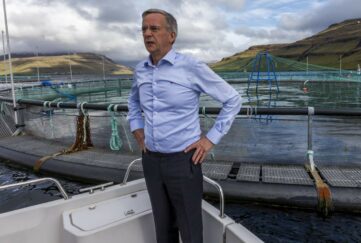Bakkafrost to postpone some slaughtering as profits drop

The Bakkafrost Group delivered a total operating EBIT or operating profit of 269 million Danish kroner (£31m) during the Q3 July to September period this year, down from DKK 325m (£37m) 12 months ago.
With lower harvests from the Faroe Islands and problems in Scotland, the results were not unexpected, but the company has also lowered its harvest forecast for the current year, down from 93,000 tonnes to 73,000 tonnes.
In both Scotland and the Faroe Islands, CEO Regin Jacobsen said the company has decided to postpone slaughtering into the first quarter of 2024 in order to optimise the average size of the fish.
He also said the biology in both regions had improved significantly since mid-September.
The other good news is that sea lice levels, which have become a scourge in Iceland parts of Norway recently, are all-time low both in Scotland and Faroe Islands.
Freshwater treatment has been successful both for sea lice and to reduce the consequences of biological threats such as jellyfish, affecting gill health. However, jellyfish has still been one of the main challenges in Scotland this quarter.
Commenting on the results CEO Jacobsen said: “Our Fishmeal, Oil and Feed segment has delivered yet another strong quarter, but we are not satisfied with the results from the farming segments in this quarter.
“in past years we have had increasing growth rates of the fish in the Faroese farming sites, peaking last year.
“In this quarter, the growth rates have been surprisingly low, mainly in fish coming from one specific batch of smolt subjected to poor water quality in the hatchery in August 2021, which was caused by start-up issues.
“The impact on growth unveiled in this quarter demonstrating the importance of having consistent high-quality smolt.
“This is something we have worked hard on and succeeded in, however dampening volume output from our hatcheries during the process.
“Maintaining a consistent smolt quality and size is one of the main priorities, as we now increase the large-smolt production with the completed expansions at the Norðtoftir, Glyvradal and Viðareiði hatcheries in the Faroes and Applecross well under way in Scotland.
“We have now also signed a contract for the construction of a large new hatchery in Skálavík in the Faroe Islands.”
He said in Scotland, Bakkafrost released the first trial batch of large smolt from Applecross earlier this year and is now ramping up the production of high-quality large smolt.
“To reduce the biological risk, we have revised our short-term strategy for Scotland,” he continued.
“We will rely on our own large high quality smolt. Applecross hatchery will next year deliver close to all smolt, and early trial with 500g smolt in Scotland will be performed in Q1 2024. High risk sites will not be stocked or in production during Q3, until the risk has reduced by large high-quality smolt.
“Both in the Faroe Islands and Scotland, we have decided to delay harvest into Q1 2024 to optimize average size of harvested fish.
“Since mid-September, the biology is significantly improved in Scotland and is significantly improved in the Faroe Islands. This is similar to the approach we chose for Scotland last year, which proved very successful.”

